#yaqub. i love him
Explore tagged Tumblr posts
Text
i love ali and nahri so much
#city of brass#empire of gold#why are the first chapters of this book the saddest ones yet#yaqub. i love him#the sail... its resting...
0 notes
Text
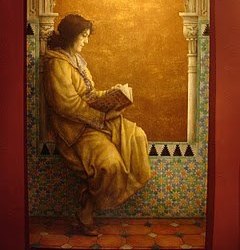
Hafsa bint al-Hajj al-Rakuniya (c.1135-1191)
She is perhaps one of the most celebrated Andalusian female poets of medieval Arabic literature. Her father was a wealthy Berber from Granada, so we may assume she grew up in luxury and received an excellent education. By the time the Almohads wrested the rule of Al-Andalus from the Almoravids, she had already started a love affair with the Governor’s secretary and her fellow poet Abu Ja'far Ahmad ibn Sa’id. From the evidence of both her poetry and his, it seems that she instigated the relationship and continued to visit him openly, despite the far stricter morality of the new Almohad rulers. Sometime around 1160, Abu Ja'far joined a rebellion against his employer, Abd al-Mu’min, governor of Granada. In 1163, he was captured and executed. Many knew and respected Hafsa as a teacher. Indeed, one of her colleagues described her as the most noteworthy teacher of her time. Her students were numerous and after the death of Abu Ja'far, she traveled widely. In the end she wound up in Marrakesh in Morocco, where the Almohad Caliph Abu Yusuf Yaqub al-Mansur engaged her to teach his daughters. She would remain there for the rest of her life.
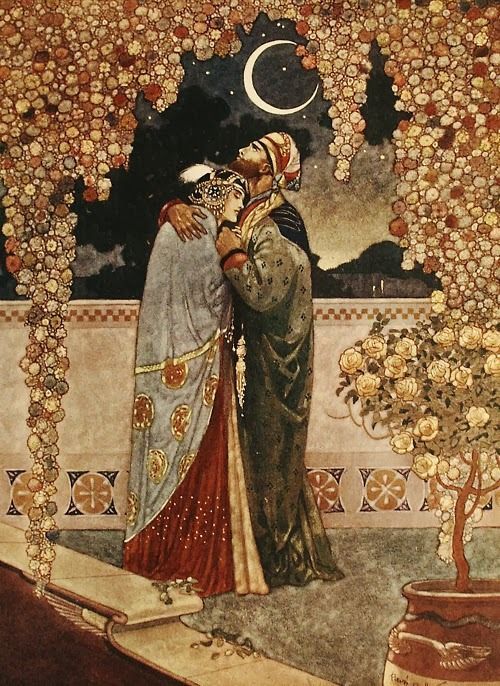
Hafsa fue hija de un noble de origen bereber, rico e influyente. Pasó su infancia y su juventud en Granada, en una época de agitación política intensa, que marcó la caída de la dinastía Almorávide y la instauración del califato de los Almohades. Por su talento y su cultura, así como por su belleza, pronto ocupó un lugar importante en la corte de los almohades de Granada, desarrollando una actividad literaria y educativa intensa y adquiriendo una reputación que llegó a traspasar los límites de Granada.
En este ambiente de la Corte y de la poesía granadina conoció al poeta Abu Yafar Ibn Said, perteneciente a la familia de los Banu Saíd, con el cual estableció una relación afectiva y pública hacia el año 1154. Esta relación dio lugar a un intenso intercambio de poemas amorosos entre los dos amantes, los cuales se han conservado hasta nuestros días. Así mismo, sus amoríos fueron cantados por los poetas de su entorno. Su situación se complica en el año 1156, en que llega a Granada Abu Saíd Utman, gobernador almohade, hijo del califa Abd al-Mumin, quien cae perdidamente enamorado de la poetisa. Oficialmente, Hafsa no cedió ante los sentimientos del gobernador, pero dejó morir su amor por Abu Yafar, quizás cansada de las veleidades afectuosas de este último o por las presiones del príncipe o de su familia. En 1158, es enviada a Rabat junto a un grupo de poetas y nobles granadinos ante el califa Abd al-Mumin. Fue éste quien le puso el sobrenombre de al-Rakuniyya (derivado de Rakuna, un tipo de salón literario).
Debido al conflictivo triángulo amoroso, Abu Yafar, quien había sido amigo y secretario del príncipe Abu Saíd, tomó a éste como objeto de sus poemas satíricos, y terminó tomando parte en una rebelión política contra el gobernador, dando lugar a su encarcelamiento y, finalmente, a su crucifixión en el año 1163, en Málaga. Hafsa lloró la prisión y la muerte de su amado, reflejándolo en unos versos punzantes y llegando hasta el extremo de vestir el hábito de viuda por él, a pesar de las amenazas del gobernador. Sumida en su tristeza, se retira de la Corte, abandonando la poesía y consangrándose en exclusiva a la enseñanza. Así vivió durante gran parte de su vida, hasta que en el año 1184, acepta la invitación del califa Abu Yusuf Yaqub al-Mansur quien la propone dirigir la educación de los príncipes almohades en Marrakesh, donde permaneció hasta el año de su muerte.
12 notes
·
View notes
Text
Tafsir Ibn Kathir: Surah Yusuf Ayah 93-95
In the Name of Allah, the Most Gracious, the Most Merciful.
12:93 "Go with this shirt of mine, and cast it over the face of my father, his vision will return, and bring to me all your family.''
12:94 And when the caravan departed, their father said: "I do indeed sense the smell of Yusuf, if only you think me not senile.''
12:95 They said: "By Allah! Certainly, you are in your old Dalal (error).''
Yaqub finds the Scent of Yusuf in his Shirt!
Allah tells about what Yusuf said to his brothers:
"Go with this shirt of mine,
Yusuf said, `Take this shirt of mine,
and cast it over the face of my father, his vision will return,'
because Yaqub had lost his sight from excessive crying,
and bring to me all your family. all the children of Yaqub.
And when the caravan departed, (from Egypt),
their father said...,
Yaqub, peace be upon him, said to the children who remained with him,
`I do indeed feel the smell of Yusuf, if only you think me not senile.
except that you might think me senile because of old age.'
Abdur-Razzaq narrated that Ibn Abbas said,
"When the caravan departed (from Egypt), a wind started blowing and brought the scent of Yusuf's shirt to Yaqub. He said (I do indeed feel the smell of Yusuf, if only you think me not senile.) He found his scent from a distance of eight days away!''
Similar was also reported through Sufyan Ath- Thawri and Shu`bah and others reported it from Abu Sinan.
Yaqub said to them, (if only you think me not senile).
Ibn Abbas, Mujahid, Ata, Qatadah and Sa'id bin Jubayr commented,
"If only you think me not a fool!''
Mujahid and Al-Hasan said that it means, "If only you think me not old.''
They said: "By Allah!
Their answer to him was,
Certainly, you are in your old Dalal.
meaning, `in your old error,' according to Ibn
Abbas.
Qatadah commented,
"They meant that, `because of your love for Yusuf you will never forget him.' So they uttered a harsh word to their father that they should never have uttered to him, nor to a Prophet of Allah.''
Similar was said by As-Suddi and others.
3 notes
·
View notes
Text
Love doesn't Require words
(Story of a blind girl and deaf-mute boy)
Rahel had been listening to the sounds of typing for quite some time, and now, Yaqub's words finally made sense.
"Oh..." she murmured, a silence falling between them. It was as if their conversation had reached a dead end, as if there was nothing more to say.
"You look beautiful tonight," Yaqub typed, his words a sudden change of topic.
Rahel bit her lower lip, startled by his unexpected compliment.
"Thank you," she replied shyly, her cheeks flushing with a hint of warmth.
"Does it really not matter to you that I cannot speak or hear?" Yaqub asked, his voice laced with a hint of insecurity.
"Why? Does it matter to you that I cannot see?" Rahel countered, her voice unwavering.
"No," Yaqub replied, his heart pounding in his chest.
"Then neither does it matter to me. We can still live a happy life together, if we try. InshaAllah," Rahel affirmed, her words filled with a quiet determination.
Yaqub couldn't help but smile at her words. "InshaAllah," he echoed in his mind, his heart filled with a newfound sense of hope.
Her understanding and acceptance brought him a sense of peace, easing the turmoil that had been brewing within him.
"Do you believe in love at first sight?" Yaqub's voice, a low murmur barely audible above the whirring of the phone's fan, broke the comfortable silence. Rahel's heart skipped a beat. The question hung heavy in the air, a weight she couldn't quite decipher.
Yaqub's fingers danced across the phone's screen, his words a cascade of emotions.
"I fell in love with you at first sight," he confessed, the ai voice echoing in the quiet room.
#writeblr#writers on tumblr#wattpad writer#original story#cute love#lovestory#my writing#writing#muslim
0 notes
Text
MOROCCO
DAY ONE
I started my journey in Africa by flying into Morocco from Minnesota. I chose to fly from MSP to RAK on Delta for a 17-hour flight costing $1,212. So, I left Minnesota at 10:30am on April 23rd and arrived in Marrakesh, Morocco at 9:30am on April 24th. The first thing I decided to do was check in at my Airbnb. I took a 16-minute cab ride to my hotel, since that is the main form of transportation for tourists. For a cab ride in Marrakesh, it's a 7 Moroccan Dirham (MAD) per kilometer. Since it was a 6.8km ride, it cost me 47.6 MAD (4.74 USD). I stayed at Riad Chamali which is a guest house located in Marrakech for 202 USD a night (2027 MAD). To be honest, I am not 100% if it's an Airbnb or if it's a hotel. All I know is that it was beautiful. After checking in, I realized I was exhausted because I just flew for 17 hours. It was time to take a nap.

When I woke up, it was 3pm, and I decided to visit the Jardin Majorelle located 15 minutes away from my hotel. I paid the 31.5 MAD (3.14 USD) fare and walked in. The Jardin Majorelle is a garden house located in Marrakesh. The ticket prices are 155 MAD (15.44 USD) for just going to the Jardin Majorelle. There are 2 different sites you can visit at this location, the Jardin Majorelle and Musée YVES SAINT LAURENT Marrakech. I chose to just go to the garden. In 1923, famous artist Jacques Majorelle bought the land that the garden sits on and began painting all the scenery he saw around him. As the years went, he built a villa and started planting the garden. The house became an attraction that Majorelle needed to keep it open so he could afford to keep living there. In 1962, he died and as did the garden. All the plants started dying, and the house started decaying. In 1980, the designer Yves Saint Laurent and Pierre Bergé decided to buy the lot and renovate it back to how it was before. Saint Laurent is still the owner of the lot and still keep up with renovations. The lot now has a museum showing off his designs and works, but I didn't buy a ticket to that exhibit.
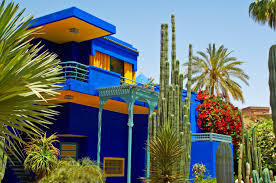

By the time I left, it was 5:30pm, and I was feeling hungry. I went to Le Douar which is a restaurant located 10 minutes away from the garden. I chose to get the Tangia Marrakchia which Is a famous Moroccan dish that is a lamb stew with garlic and lemons. Lamb is one of the main meat sources of Morocco just because it can be easily found in the country. My meal was 220 MAD (21.91 USD) and I tipped 22 MAD since 10% is the tipping custom.
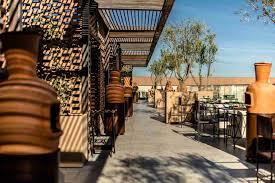
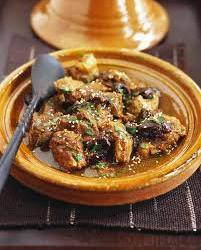
After my meal, I decided to head back to my room, and on the way there I decided to pick up a translation book because the most spoken language is Arabic. Once I got back, I went to sleep.
DAY TWO
I woke up today and decided to visit a famous religious building in Marrakesh. The Kasbah Mosque, located just a 15-minute walk away from my hotel, is a mosque built in 1185-1190. The building was commissioned by the caliph Yaqub al-Mansur for the new Marrakesh. 99% of the population in Morocco is Muslim and mostly all of them are Sunni. Sunni is the largest branch of Islam, and it differs from Shia because they believe that the Prophet did not explicitly declare a successor. The Kasbah Mosque is mainly for Sunni, but they still welcome Shia.
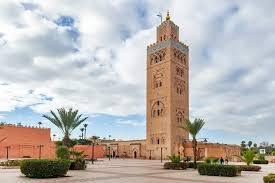
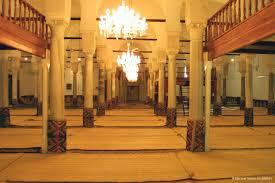
In the mosque, I stopped and look at the Saadian Tombs. The tombs were built in the 16th century by Sultan Ahmad al-Mansur who was the third ruler of the Saadian dynasty. The tombs have two main sections that have several chambers each. They also have very intricate carving on the walls, and color all over the tiles. The carvings depict scenes from Islamic history and mythology.
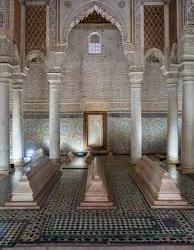
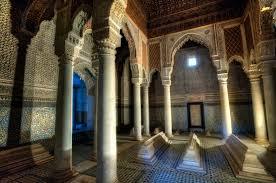
After visiting the mosque and learning more about the history of Islam in Morocco, I decided to finally get something to eat. I decided to stop at ViaVia Marrakech. ViaVia Marrakech was founded by a Belgian couple who loved travelling, and as they were travelling they found Morocco and decided to stay. I chose to get the Sweet Chicken Wings for an appetizer, the ViaVia Burger for my entrée, and Pastilla Au Lait for dessert. Pastilla Au Lait is a French dish that just translate to "dough with milk." My meal ended up being 300 MAD (29.88 USD) and I tipped 30 MAD due to the custom.
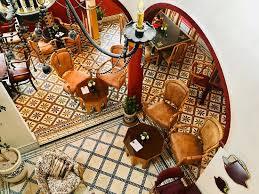

After eating lunch, I decided to visit Parc Lalla Hasna which is a famous tourist attraction in Marrakech. It is a huge park mainly used for bird watching. The top 5 birds you will most likely see while visiting are the Booted Eagle, Spotless Starling, Great Grey Shrike, Little Swift, and the Common Bulbul, but you can also see 42 different species. Parc Lalla Hasna is free and open to the public. Natives usually visit the park at night, and they just talk and stroll. The park is right next door, making its most notable feature the minaret, which is a tower attached to a mosque that Muslims use to pray.
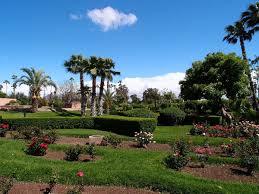
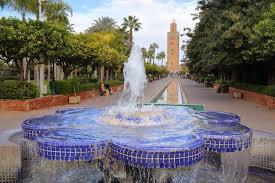
On my walk back to my hotel, I stopped by Cyber Park. Located directly in the heart of Marrakech, Cyber Park is 8 hectares and houses a museum and an institute of art. The park was built in the 18th century by the son of the Sultan, Moulay Abdelsalam. The main thing people do when visiting Cyber Park is see the telecommunication museum. They show off different pieces of furniture, photographs, and other pieces that show the advancements in society. You can also walk through the rose garden or use your computer due to the park's free internet access.
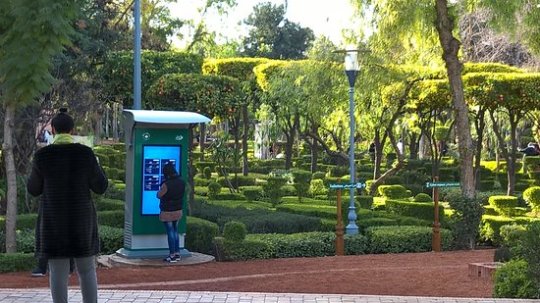
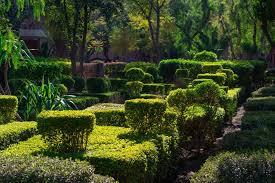
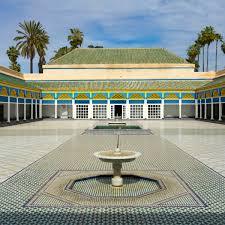
Once leaving the park, I continued on my walk back home and go to sleep after my long day of sightseeing.
DAY THREE
Today, I woke up and realized that I needed to hit the road immediately to make it to my next stay in Morocco. I was deciding to leave Marrakech and visit the countries capital, Rabat, located right on the shore and houses 1,959,000 people. I called a cab to get to my next Airbnb, located 3 hours and 41 minutes away. My cab fare ended up costing 2,303 MAD (229.39 USD). I got to my Airbnb named "Super Luigi" and I unpacked. My Airbnb was 1204 MAD (120 USD) a night.

Lucky for me, my Airbnb was located right next to a Syrian restaurant called Yamal Acham. I decided to get Mhamara which is a Middle Eastern dip made from walnuts and roasted red peppers. People usually eat this with a meze platter, but it still tastes good to eat by itself. The dip cost me 25 MAD (2.49 USD). For dessert, I got Salade de fruits, which is just a fruit salad. This also cost 25 MAD.
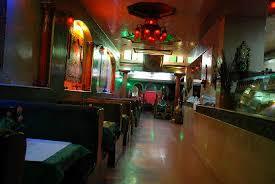
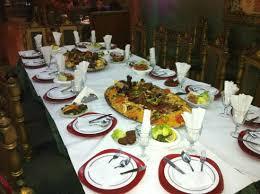
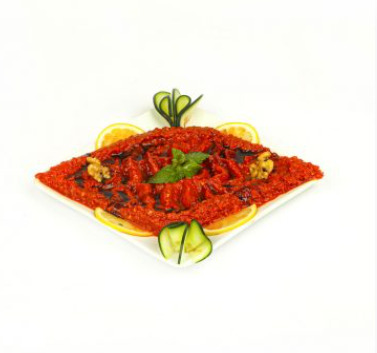

After lunch, I decided to travel to take the 6-minute cab ride to the Rabat Beach. Rabat Beach is a main tourist attraction in Morocco. The beach stretches 2.5km and that includes both private and public beaches. At Rabat Beach, you can participate in many different water activities such as, kayaking, windsurfing, jet-skiing, horseback riding, and sailing. I personally chose to go horseback riding because apparently Rabat is one of the best cities to go horseback riding in! I could not find a price for how much it costs, so I just assume it was free ¯\_(ツ)_/¯.
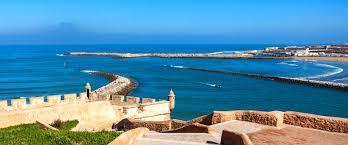
After my horseback ride on the beach, I decided to take a cab back to my Airbnb and spend the rest of the day inside.
DAY FOUR
I woke up and decided to go get something to eat. I chose to go to Hamza Food, located a 12-minute walk from my Airbnb. Hamza Food specializes in Kumpir which is a Turkey (country) dish that is a baked potato that is sliced open, and then you choose what toppings you want. I got Kumpir poulet which is just chicken added to the potato. My meal was extremely cheap, it was just 30 MAD (2.95 USD)!
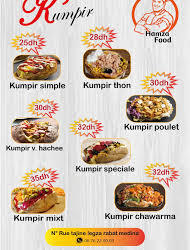

After my breakfast, I decided to head over to the Théâtre National Mohammed V. This theatre has many different showings. They offer music, operas, ballet, movies, private events, and children showings. They have different showings almost every single night. Today's showing at 11:30 was Cinderella in Rabat, which is a remake of the classic Cinderella story, but instead it takes place in Rabat. This was one of the children shows.
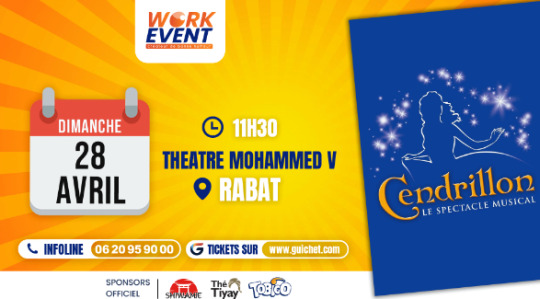
After the showing of Cinderella in Rabat, I decided to hop across the street to Nouzhat Hassan Garden. Just like any other park, Nouzhat Hassan Garden mainly consists of nature and an informational building. I thought this would be the perfect time to sit outside and learn about the country of Morocco. In 1912, Morocco was colonized by France, and gained independence in 1956, but French influences still remain in the country. There are many things that tourists need to know before travelling to Morocco. One of the biggest ones is to dress conservatively, even if the climate is Mediterranean and the average temperature year round is 86°F. Morocco is a Muslim country, and even if you don't practice Islam, it is still respectful to follow some of their customs that come with the religion. You are also expected to use your right hand for everything, as your left hand is used for chores and bathroom hygiene. Locals would find it extremely disrespectful if you used the left hand to open a door, touch a cup, or eat food. You are also not supposed to give praise. Giving compliments can weird out the locals as it is not how they were raised, so they can get uncomfortable if you were to do so.
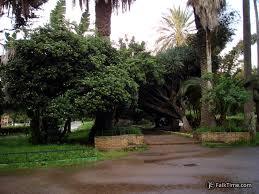

After my walk in the park and learning about Moroccan customs, I decided to get some dinner before heading to bed, as tomorrow I have my flight out of here and into Botswana. Close to Nouzhat Hassan Garden was a La Bamba Mexican restaurant. Here, I decided to get the Paella Bogavante which is a Paella with lobster. It cost 600 MAD (59.03 USD). After finishing my meal, I went back to my Airbnb and went to bed.
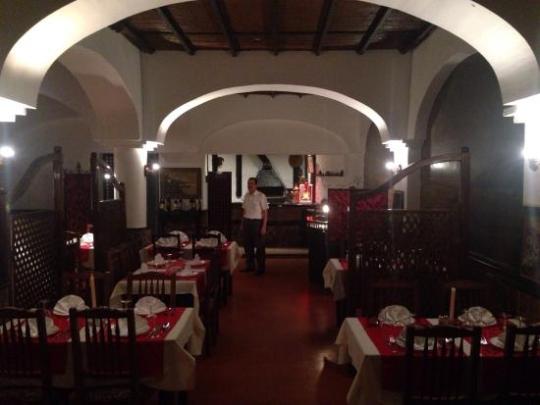
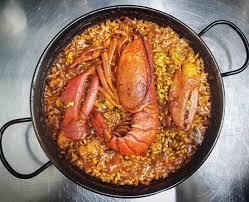
DAY FIVE
Today I left from Morocco to Botswana. While on the plane, I wanted to reflect on my time in Morocco. I really enjoyed being here. I liked seeing how much nature varies in Morocco compared to not only Minnesota, but Belize and Panama too. I like that I got a varied amount of food that wasn't all from one region of the world. I really appreciated trying Mhamara and embracing Moroccan culture. I am excited to head over to Botswana and see how Southern Africa lives.
0 notes
Text
﷽
➖➖➖
THE BLESSING IN AFFLICTION
➖➖➖
SEEK HELP FROM ALLAH
➖➖➖
You felt it's not easy to move on because:
▪️You lost a loved one?
▪️Your job?
▪️Your properties?
Or maybe, you feel you've lost everything!
No! Do not despair in the Mercy of Allah (ﷻ) for this is a chance to win His pleasure.
Allah says,
وَلَنَبْلُوَنَّكُم بِشَىْءٍ مِّنَ ٱلْخَوْفِ وَٱلْجُوعِ وَنَقْصٍ مِّنَ ٱلْأَمْوَٰلِ وَٱلْأَنفُسِ وَٱلثَّمَرَٰتِۗ وَبَشِّرِ ٱلصَّٰبِرِين
And We will surely test you with something of fear and hunger and a loss of wealth and lives and fruits, but give good tidings to the patient
(2:155)
Somewhere else,
▪️أَحَسِبَ ٱلنَّاسُ أَن يُتْرَكُوٓا۟ أَن يَقُولُوٓا۟ ءَامَنَّا وَهُمْ لَا يُفْتَنُونَ
▪️وَلَقَدْ فَتَنَّا ٱلَّذِينَ مِن قَبْلِهِمْۖ فَلَيَعْلَمَنَّ ٱللَّهُ ٱلَّذِينَ صَدَقُوا۟ وَلَيَعْلَمَنَّ ٱلْكَٰذِبِينَ
Do the people think that they will be left to say, "We believe" and they will not be tried? But We have certainly tried those before them, and Allaah will surely make evident those who are truthful, and He will surely make evident the liars.
(29:2-3)
---
Many before you were tested. The Prophets of Allah (عليه السلام) were tested and were successful because of their patience.
💠 Ibrahim (عليه السلام) was thrown into the fire.
💠 Yunus (عليه السلام) was swallowed by a whale.
💠 Yaqub ( عليه السلام) lost his eyesight.
💠 Ayyub ( عليه السلام) was tested with his health.
💠 Muhammad (عَلَيْهِ ٱلسَّلَامُ) was an orphan who also lost his children at their tender ages.
They were all successful because of their sincere trust in Allah (ﷻ) and patience.
--
It was narrated from Mus'ab bin Sa'd (رضي الله عنه) that his father, Sa'd bin Abu Waqqas (رضي الله عنه), said:
"I said: "O Messenger of Allah, which people are most severely tested?' He said: "The Prophets, then the next best and the next best. A person is tested according to his religious commitment. If he is steadfast in his religious commitment, he will be tested more severely, and if he is frail in his religious commitment, his test will be according to his commitment. Trials will continue to afflict a person until they leave him walking on the earth with no sin on him.'"
(Sunan Ibn Majah 4023)
---
The Patient and their Reward
In continuation of Ayah 155 (above) from Surah al-Baqarah, Allaah (ﷻ) says:
▪️ٱلَّذِینَ إِذَاۤ أَصَـٰبَتۡهُم مُّصِیبَةࣱ قَالُوۤا۟ إِنَّا لِلَّهِ وَإِنَّاۤ إِلَیۡهِ رَ ٰجِعُونَ
▪️أُو۟لَـٰۤىِٕكَ عَلَیۡهِمۡ صَلَوَ ٰتࣱ مِّن رَّبِّهِمۡ وَرَحۡمَةࣱۖ وَأُو۟لَـٰۤىِٕكَ هُمُ ٱلۡمُهۡتَدُونَ
(Those) Who, when disaster strikes them, say, "Indeed we belong to Allaah, and indeed to Him we will return." Those are the ones upon whom are blessings from their Lord and mercy. And it is those who are the [rightly] guided.
(2:156-157)
That is, when they are touched with afflictions, they do not speak ill of their Lord nor seek help from other than Him, their reward is blessing from their Lord, and He rewards them beyond what has been taken from them.
What to do in Periods of Afflictions
Allah (ﷻ) says,
يَٰٓأَيُّهَا ٱلَّذِينَ ءَامَنُوا۟ ٱسْتَعِينُوا۟ بِٱلصَّبْرِ وَٱلصَّلَوٰةِۚ إِنَّ ٱللَّهَ مَعَ ٱلصَّٰبِرِينَ
O you who have believed, seek help through patience and prayer. Indeed, Allah is with the patient.
(2:153)
---
And how Merciful is Allah (ﷻ), He promises not once but twice that:.
▪️فَإِنَّ مَعَ ٱلْعُسْرِ يُسْرًا
▪️إِنَّ مَعَ ٱلْعُسْرِ يُسْرًا
For indeed, with hardship [will be] ease. Indeed, with hardship [will be] ease.
(94:5-6)
With Allah, the soul finds comfort and the sweetness of eeman.
May Allah (ﷻ) grant us true patience.
آمين
0 notes
Text
As you get older, you understand why Yaqub عليه السلام said "I only complain of my grief and my suffering to Allāh." [12:86]
There comes a time when you're going through something you cannot even put in words and share with someone. There comes a time when it becomes so overwhelming all you can do is cry in front of God and beg Him to make a way out of for you. To send you relief and to heal your heart. And while you look at these things as hardships, perhaps they're there because God wants you to make you stronger, to teach you that you really don't have anyone besides Him at the end of the day. Perhaps to make you understand that you should rely on Him alone, and that no one will understand your heart better than He who created it. You will soon realise that those hardships were only a way for you to get closer to God, because that's how much He loves you.
0 notes
Text
Nothing Ties The Heart In Knots More Than Loved Ones
As-Salamu Alaikum Reading the ayah in Surat Yusuf, إِنَّمَا أَشْكُو بَثِّي وَحُزْنِي إِلَى اللَّهِ (I only complain of my grief and sorrow) made me think. The grief of Yaqub, peace be upon him, has not left him at this point for several years, since the disappearance of his son whom his other sons dropped in a well. They brought their father a bloody shirt claiming it was his young son, but…
View On WordPress
0 notes
Photo
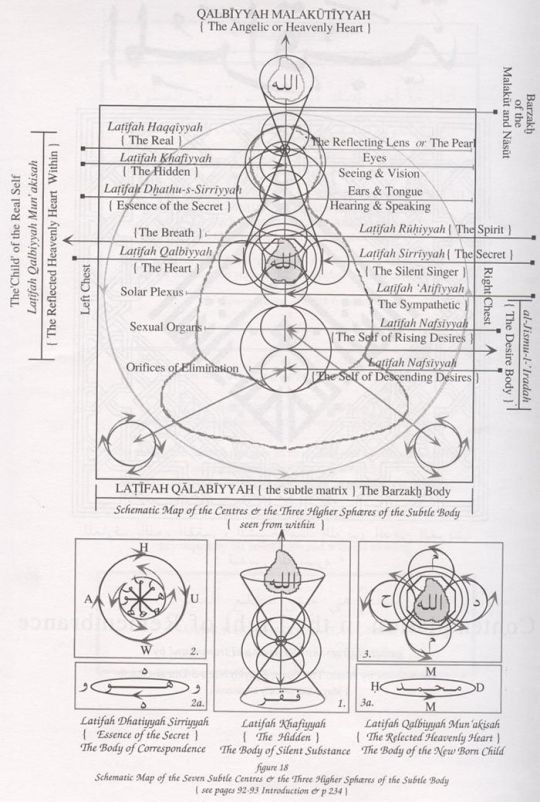
The battle of Nafs (ego)
In Islam every human soul consists of a duality of good (light of the self) and evil (shadow of the self). This battle explains the anxious nature of the soul.
“Indeed, mankind was created anxious: When evil touches him, impatient, And when good touches him, withholding [of it]” Quran : 70, 19-25
Even when everything goes well, we aren’t generous out of fear it won’t last.
As complex as the Arabic language can be, Nafs has various translations: anger, ego or the self.
There’s 3 main levels of Nafs (ego) that feed into the negative side of us, and take over if not acted upon (progressively worse):
1. The negative suggestion of the obsessive self (waswâs al-nafs) Not only an external source of evil (Devil) is able to throw negative suggestion. The human soul has the same ability.
The self is victim of the ego (nafs). But it can be of great help when disciplined.
“Indeed, [it is] We [Who] created humankind and [fully] know what their souls whisper to them, and We are closer to them than [their] jugular vein.” Quran : 50, 16
2. Dark influence of the begging self (taswîl al-nafs) When we keep feeding into (our) negative suggestion, it becomes a habit: the machine of evil. We then act upon the feeling of ego.
“And they brought his shirt, stained with sheep blood. He responded, “No! Your souls must have tempted you to do something [evil]. So [I can only endure with] beautiful patience! It is Allah’s help that I seek to bear your claims.” Quran : 12, 18
With the passage of time, the malice in the hearts of Joseph’s (Yusuf) brothers kept growing. They envied Joseph (Yusuf) because they felt their dad, Jacob (Yaqub), loved Joseph (Yusuf) more. They decided to act up on it by throwing Joseph (Yusuf) in a well. Then proceeded to come back with his shirt covered in sheep’s blood.
3. Deification of the ego (worshipping your own ego) This ongoing passion can take over. Where as we become servant of our own ego. In this stage we are (unconsciously) living as prisoners feeding into our negative self. Which keeps us further away from serving God.
“Have you seen him who has taken his desire to be his own god and whom Allah has led astray knowingly, and has set a seal upon his hearing and his heart and put over his vision a veil? So who will guide him after Allah?” Quran : 45, 23
The heart is the receptacle between the soul and the spirit
The heart is the receptacle, named so because of its reversals: it is like a feather hanging from a tree that the wind turns back and forth. The heart is unstable, and goes through a constant state of changes.
The spirit is the opposite of the ego. It’s the light God blew in the first soul on earth. The light in us is often smothered by the ego. But reappears in spiritual context. E. a. when in a spiritual environment, during Holy Month, during pilgrimage or surrounded by religious people, ...
Healthy surroundings flare up our internal, spiritual light (spirit). We then come full circle, and ease all anxious sensations caused by the ego (nafs). That ultimately are a result of the absence of God.
Thus, the purification of the soul comes down to the progressive awakening of the spirit (light) that is present in each and all of us.
425 notes
·
View notes
Text
Opening Lines meme
Rules: List the first lines of your last 20 stories. (If you have less than 20, just list them all!) See if there are any patterns. Choose your favourite opening line. Tag some people to play the next round!
Gonna do my posted fics and chapters, starting with the most recent!
1. Nahri sighed contently in her sleep, snuggled close inside Ali's embrace.
2. Nahri relishes the feel of Ali’s strong hands pressed to her waist, his fingers keeping her still as the canal water envelops them up to their chests.
3. "Okay, it's time." Nahri announced.
4. In the quiet twilight of the palace, Nahri opened the door to Ali’s office.
5. The sweet, flaky aroma filled the palace kitchen air and Ali inhaled it with delight.
6. Nahri walked down the palace hallways as a familiar shout caught her attention.
7. Ali pushed himself out of the mist-filled fountain, water streaming down his arms and burnished crocodile vestments.
8. “Stop stalling, Jamshid,” Nahri scolded in annoyance.
9. Ali had begun to lose count of the ways Nahri's fingers slipped into his, the gentle embrace both comforting and achingly brief.
10. The Royal Library meeting room was peaceful after dhuhr, with light streaming in through the stained glass windows.
11. Pleasant dreams of breakthrough surgeries ended with a snap as Nahri's bed suddenly jolted.
12. Nahri heard the chorus of tiny meows before she even opened the door to Ali’s office.
13. The Royal Harem garden is peaceful in the late morning, and a pleasant break from their respective jobs.
14. They stood upon the palace roof's pavilion, the one that held so many memories, in the early dawn light.
15. The knock on his door was barely audible. It was also coming from the balcony.
16. Sweltering under the hot sun and exhausted from their long walk through the Ta Ntry jungle, Nahri sighed, “Is nap not an option?”
17. The room was empty, save for him.
18. “So this is where you lived?” Ali asked, looking at the remains of a small stall.
19. They sat in the candlelight, enjoying the last of the kabsa Yaqub's wife had made hours earlier.
20. It's past midnight when she hears it, and Nahri rushes from the kitchen; the half-peeled orange left spinning on the table.
Trends: They're all introductory/action lines 😂 Sometimes dialogue, but I really internalized that 'include who & what they're doing or where they are' advice. 😋
Favorites: 9 into infinity 💗💗💗 but also 4, 5, 15, 17, and 20.
I saw @cozcat doing this and it looked really fun. 💕 This reminded me of how much I love writing (and Nahri & Ali lmao). Gonna tag @biorust-art, @aurorawest, @rustam-e-nahid, and whoever else wants to do this! 💞
10 notes
·
View notes
Note
salaam aleikum, can i vent and ask u for your advice in the mean time too? I feel so bad and my heart is in terrible pain and I don’t know how to cope
وعليكم السلام ورحمة الله وبركاته ،
of course you can. i opened my dms so that you can message me if we aren’t mutuals that is. i’d like to remind you of some ayahs that always comfort me when i feel i’m overwhelmed & i can’t cope.
[Inshirah:6]
إِنَّ مَعَ ٱلْعُسْرِ يُسْرًا
indeed, with hardship will be ease.
Allāh ﷻ says the ease comes with the hardship; the ease is there simultaneously. so in a moment of hardship start to appreciate the small blessings that you usually overlook. the more you’re grateful to Him, the more He blesses you. Allāh ﷻ loves you more than a mother loves her child He only wants the best for you. if you turn to Him that He’ll help you in ways you’ll never believe.
[Baqarah:286]
لَا يُكَلِّفُ ٱللَّهُ نَفْسًا إِلَّا وُسْعَهَا…
Allāh does not burden a soul beyond that what it can bear.
Allāh ﷻ tests those He loves so the test you’re going through is His way of showing His love for you. never forget that Allāh ﷻ is the Gentle, the Loving, the Kind. so when things begin to look unbearable ask Him for help to alleviate your struggles. & He always will. i can see that you’re hurting a but all the feelings of turmoil in your heart though painful are all signs that your sins are being expiated.
the prophet muhammad ﷺ, said
“nothing afflicts a Muslim of hardship, nor illness, nor anxiety, nor sorrow, nor harm, nor distress, nor even the pricking of a thorn, but that Allah will expiate his sins by it.” [Bukhari]
this does not mean you cannot be upset or cry. rather it means the opposite. a dear friend once told me, that prophet yaqub عليه السلام cried for decades over prophet yusuf عليه السلام, he cried until his eyes went white and he was a prophet of Allāh swt. this doesn’t mean he wasn't patient or that he refused or revolted or blamed Allāh ﷻ. it doesn’t make him less of a believer rather it showed his human side - his vulnerability. prophet yaqub عليه السلام displays a beautiful patience where he’s more confident in His promise then what his eyes can see before him.
[Yusuf:12]
…فَصَبْرٌ جَمِيلٌ وَاللّهالْمُسْتَعَانُ عَلَى مَا تَصِفُون.
so patience is most fitting. And Allah is the one sought for help against that which you describe."
in spite of your struggles there will always be a way out. prophet yunus عليه السلام was stuck in the whale;a dark place with seemingly no escape. but Allāh swt delivers him from the whale ‘even in the belly of the whale there was hope.’ Allāh is the Supreme Solver, He can open doors for you that you never even knew existed. all we have to do is ask. the more sincere we are in our du’as & prayers the better.
the prophet muhammad ﷺ, said
“verily, Allah is conscientious and generous. He would be shy, when a man raises his hands to Him, to turn them away empty and disappointed.” [Timirdhi]
12 notes
·
View notes
Note
AS A MUSLIM I WOULD LOVE TO SEE A GAME LIKE THAT, your designs are absolutely amazing I love them so much I 😭💖💞💖💞💖💞 do you have an overall plot for the game ? 👁 👁 if so I am looking with two eyes respectfully,,,
TWO EYES??? LISTEN DON’T ENCOURAGE ME TOO MUCH I HAVE EXAMS AROUND THE CORNER I NEED TO FOCUS ASDFGHJKL
But the potential game, yes. I think I would make it so that at the beginning of the game you choose a boy, the nikkah (the actual Islamic marriage contract for those who don’t know what that is) and wedding itself would probably happen offscreen unless I can find a good way to integrate it.
In the game itself (if I ever do make it) you can choose to be as affectionate or as reserved as you want and it wouldn’t affect the ending. The game wouldn’t have any bad endings because screw that, I wanna have a satisfying happy ending even if they aren’t perfect.
Each route would deal with a different issues that I have faced/ know people who have faced/ know of as a Muslim person. As such, some routes would be a little heavier in terms than others. An example of a ‘lighter’ route would be Yaqub’s (the monster in the top right with the blindfold), which would be dealing with loneliness and the presentation of relationships in Western media - specifically how it causes people who aren’t in realtionships to feel like they are unlovable. But like I’d put a warning on each of the routes because I ain’t about to slap people in the face with stuff they don’t wanna see.
I have a pretty solid idea of what I want each route to cover (except the plant boy, I’m still feeling around for him), but I don’t have anything actually written down because this came to me like a fever dream and I cooked it all up within the space of a day.
If you’d like to know about the other boys and their routes just ask!
#nais replies#no but for real you guys would have to wait until after june 3rd for like#actual solid plans#apologies#otome game#yaqub#monster husband#jellophoid
12 notes
·
View notes
Text
10 Interesting Brazilian Fiction Novels
1.) “I Didn’t Talk” By: Beatriz Bracher
A professor prepares to retire—Gustavo is set to move from Sao Paulo to the countryside, but it isn’t the urban violence he’s fleeing: what he fears most is the violence of his memory. But as he sorts out his papers, the ghosts arrive in full force. He was arrested in 1970 with his brother-in-law Armando: both were vicariously tortured. He was eventually released; Armando was killed. No one is certain that he didn’t turn traitor: I didn’t talk, he tells himself, yet guilt is his lifelong harvest. I Didn’t Talk pits everyone against the protagonist—especially his own brother. The torture never ends, despite his bones having healed and his teeth having been replaced. And to make matters worse, certain details from his shattered memory don’t quite add up... Beatriz Bracher depicts a life where the temperature is lower, there is no music, and much is out of view. I Didn't Talk's pariah’s-eye-view of the forgotten “small” victims powerfully bears witness to their “internal exile.” I didn’t talk, Gustavo tells himself; and as Bracher honors his endless pain, what burns this tour de force so indelibly in the reader’s mind is her intensely controlled voice.
2.) “The Brothers” By: Milton Hatoum
Set among a Lebanese immigrant community in the Brazilian port of Manaus, The Brothers is the story of identical twins, Yaqub and Omar, whose mutual jealousy is offset only by their love for their mother. But it is Omar who is the object of Zana's Jocasta-like passion, while her husband, Halim, feels her slipping away from him, as their beautiful daughter, RGnia, makes a tragic claim on her brothers' affection.
3.) “Crow Blue” By: Adriana Lisboa
I was thirteen. Being thirteen is like being in the middle of nowhere. Which was accentuated by the fact that I was in the middle of nowhere. In a house that wasn't mine. in a city that wasn't mine, in a country that wasn't mine, with a one-man family that, in spite of the intersections and intentions (all very good), wasn't mine.When her mother dies, thirteen-year-old Vanja is left with no family and no sense of who she is, where she belongs, and what she should do. Determined to find her biological father to fill the void that has so suddenly appeared in her life, Vanja decides to leave Rio de Janeiro to live in Colorado with her stepfather, a former guerrilla notorious for his violent past. From there she goes in search of her biological father, tracing her mother's footsteps and gradually discovering the truth about herself. Rendered in lyrical and passionate prose, Crow Blue is a literary road trip through Brazil and America, and through dark decades of family and political history.
4.) “Child of The Dark” By: The Diary of Carolina Maria de Jesus
A first-hand account of life in the streets of Sao Paulo from 1955 to 1960, details the plight of an artist, writer and single mother of three children who, while living in a hovel, supported her family by digging through the garbage for paper and scraps to sell.
5.) “The Sad End of Policarpo Quaresma” By: Lima Barreto
Policarpo Quaresma - fastidious civil servant, dedicated patriot, self-styled visionary - is a defender of all things Brazilian, full of schemes to improve his beloved homeland. Yet somehow each of his ventures, whether it is petitioning for Brazil's national language to be changed, buying a farm to prove the richness and fertility of the land, or offering support to government forces as they suppress a military revolt - results in ridicule and disaster. Quixotic and hapless, Quaresma's dreams will eventually be his undoing.
6.) “Adultery” By: Paulo Coelho
A woman in her thirties begins to question her seemingly perfect life: she is married to a rich and loving husband, has well-behaved children and a successful newspaper career. Her apathy changes when she interviews a former boyfriend, now a successful politician.
7.) “The Posthumous Memoirs of Bras Cubas” By: Joaquim Maria Machado de Assis
The Posthumous Memoirs of Brás Cubas builds on a macabre conceit—Brás Cubas, already dead, is recounting his adventures from beyond the grave. This vantage point allows Brás Cubas to talk about his life with the kind of blithe irony and callousness only accessible to those who have nothing to lose or gain.Jun 17, 2020
8.) “Lord” By: João Gilberto Noll
As Lord begins, a Brazilian author is arriving at London's Heathrow airport for reasons he doesn't fully understand. Only aware that he has been invited to take part in a mysterious mission, the Brazilian starts to churn with anxiety. Torn between returning home and continuing boldly forward, he becomes absorbed by fears: What if the Englishman who invited him here proves malign? Maybe he won't show up? Or maybe he'll leave the Brazilian lost and adrift in London, with no money or place to stay? Ever more confused and enmeshed in a reality of his own making, the Brazilian wanders more and more through London's immigrant Hackney neighborhood, losing his memory, adopting strange behaviors, experiencing surreal sexual encounters, and developing a powerful fear of ever seeing himself reflected in a mirror.
9.) “Perfect Days’ By: Ralphael Montes
Teo Avelar is a loner. He lives with his paraplegic mother and her dog in Rio de Janeiro, he doesn't have many friends, and the only time he feels honest human emotion is in the presence of his medical school cadaver--that is, until he meets Clarice. She's almost his exact opposite: exotic, spontaneous, unafraid to speak her mind. She's working on a screenplay called Perfect Days about three friends who go on a road trip across Brazil in search of romance. Teo begins to stalk her, first following to her university, then to her home, and when she ultimately rejects him, Teo kidnaps her, and they embark upon their very own twisted odyssey across Brazil, tracing the same route outlined in her screenplay. Through it all, Teo is certain that time is all he needs to prove to Clarice that they are made for each other, that time is all he needs to make her fall in love with him. But as the journey progresses, he keeps digging himself deeper, stopping at nothing to ensure that no one gets in the way of their life together.
10.) “A Cup of Rage” By: Raduan Nassar
A pair of lovers—a young female journalist and an older man who owns an isolated farm in Brazil—spend the night together. The next day they proceed to destroy each other. Amid vitriolic insults and scorching cruelty, their sexual adventure turns into a savage power game between two warring egos. This intense, erotic masterpiece—written by one of Brazil’s most highly regarded modernists—explores alienation, arrogance, machismo meltdown, the desire to dominate, and the wish to be dominated.
4 notes
·
View notes
Text
Tafsir Ibn Kathir: Surah Yusuf Ayah 13-14
In the Name of Allah, the Most Gracious, the Most Merciful.
12:13 He (Yaqub) said: "Truly, it saddens me that you should take him away. I fear lest a wolf should devour him, while you are careless of him.''
12:14 They said: "If a wolf devours him, while we are `Usbah (a group), then surely, we are the losers.''
Ya`qub's Answer to Their Request
Allah narrates to us that His Prophet Yaqub said to his children, in response to their request that he send Yusuf with them to the desert to tend their cattle,
He (Yaqub) said: "Truly, it saddens me that you should take him away.
He said that it was hard on him that he be separated from Yusuf for the duration of their trip, until they came back.
This demonstrates the deep love that Yaqub had for his son, because he saw in Yusuf great goodness and exalted qualities with regards to conduct and physical attractiveness associated with the rank of Prophethood. May Allah's peace and blessings be on him.
Prophet Yaqub's statement next,
I fear lest a wolf should devour him, while you are careless of him.
He said to them, `I fear that you might be careless with him while you are tending the cattle and shooting, then a wolf might come and eat him while you are unaware.'
They heard these words from his mouth and used them in their response for what they did afterwards. They also gave a spontaneous reply for their father's statement, saying,
They said: "If a wolf devours him, while we are an `Usbah, then surely, we are the losers.
They said, `If a wolf should attack and devour him while we are all around him in a strong group, then indeed we are the losers and weak.'
0 notes
Text

The husband and I attended a talk last night by Sh Yaqub al-Dehlawi on implementing Islam into a Muslim household and the effects it has on the upbringing of children. The Sheikh mentioned many points illustrated with examples of hadiths and stories which he accumulated from his travels.
The Sheikh mentioned some very simple and beneficial points which we plan to implement in our daily lives inshaaAllah in order to safeguard our children.
• The impotence of creating an environment at home which is Islamic. Having Quran recitation playing in the background; reciting out loud so our children can hear, taking simply 10 minutes out of our day to discuss hadiths with one another, being loving and compassionate towards the members within our household and our neighbours. Our actions should be embodied through the etiquettes of Islam- having good character, our child should witness these things through our actions before our words.
• The responsibility of children outside the house. We should never assume that our children are ok- this is one of many of Shaytans whispers. Ask them daily what they got up to, make sure you check up on them, ask them who their friends are. Keep them protected by keeping them close with the masjids so that our children gain good companionship.
• Dealing with our children in the Prophetic manner. The Prophet pbuh was loving towards his wives and children, never did he oppress them. Express your love to your children, tell them that you love them! How many fathers shy away from saying ‘I love you’ to their kids? Speak to them in a nice and kind tone. Even Allah swt, when in the Qur’aan He states anything which is forbidden for us, He gives a reason for why it is forbidden so give reasons to our children when we are trying to explain something to them.
Most importantly- we need to be good examples for them. Fixing ourselves first will allow our children to lead by example. Sh Haitham once said- ‘The most important Tarbiyah for a child is for him to witness his father and mother showing love towards one another’. May Allah swt make our children the coolness of our eyes Aameen.
157 notes
·
View notes
Note
Lol there is nothing wrong with crying in salaat bc of wordly matters. We're supposed to turn to Allah with all of our problems. We have problems in the first place bc we're human and this is the worldy life which is full of trials and hardships. Allah wants us to turn to Him with all of our problems. Prophet Musa turned to Allah when he was struggling with worldly matters, Maryam cried to Allah bc of worldly matters, so did Yaqub the father of Yusuf. My point is there is no sin for doing so.
Yeah I personally lean toward this opinion as well. What strongly comes to mind is how Yaqoub's cries were specifically documented in the Qur'an as he ached all those years in longing for the sight of his son. And the other examples you brought are spot on as well - may Allah reward you!
I think the point the previous anon brought up only counts for those who cry so much over dunya matters that it comes in the way of prayer - but the essence of prayer is to glorify Allah and express our thanks and need of Him - so I find crying because we are in need of His mercy to be something Allah understands and loves.
Especially due to a hadith that says, "Allah laughs at the despair of his servant, for He will soon relieve him" (sunan-ibn mājah 181)
12 notes
·
View notes